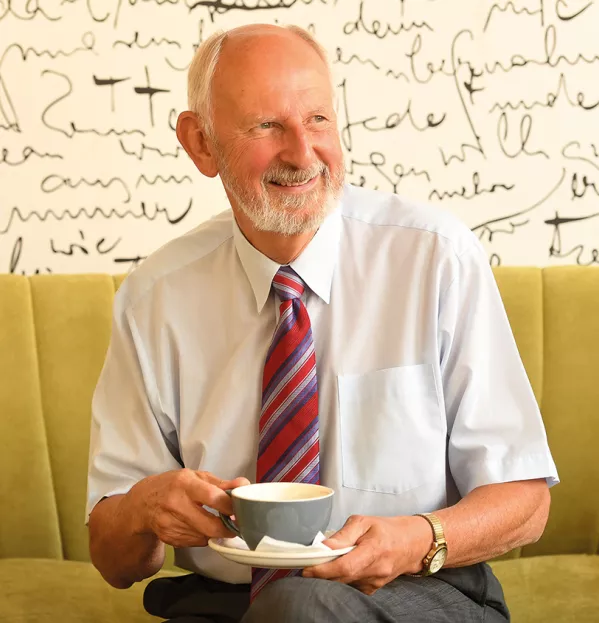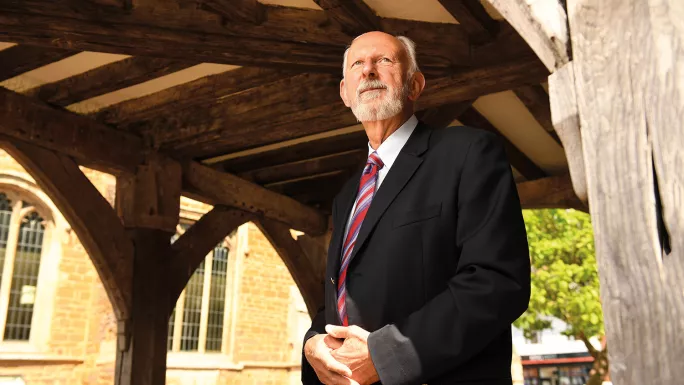
‘Any malpractice that takes place undermines the exam system’

As a former general secretary of the Association of School and College Leaders, Sir John Dunford is a well-established commentator on England’s education system. But his thoughts are about to acquire a new importance for teachers. Exam boards have appointed the long-standing Tes contributor as chair of a new commission on “exam malpractice” - otherwise known as cheating.
The recommendations the body makes will have consequences for every school, teacher and pupil in the land.
So why is a man with four decades of work in the education sector behind him disrupting his retirement once again to lead on such a contentious issue?
“People ask me to do interesting things,” he says simply, sipping a coffee in a Market Harborough cafe near his Leicestershire home.
The 71-year-old was also attracted by the fact that the commission would have a “beginning, a middle and an end”. It starts next month and will deliver its recommendations in April. He was offered a “time-limited opportunity to look into something significant”, and he took it.
Malpractice has soured the exam season in recent years. Pearson, which runs the Edexcel board, has seen its C4 A-level maths paper leaked for the past two summers. This year’s leak has so far resulted in five students being disqualified, with results withheld for a further 30 and a police investigation still ongoing.

Malpractice seems to be on the rise in general. According to the latest Ofqual figures, the number of penalties issued to students sitting GCSEs and A levels has increased by a quarter, from 2,180 in 2016 to 2,715 in 2017. Penalties issued to school and college staff, meanwhile, have increased to 895 from 360 in 2016 - a rise of 149 per cent.
And the problem could be much worse than that. Dunford suggests that recent reforms to reduce the volume of coursework may have made malpractice more difficult to detect.
“If the marks on your coursework and your written exams are very different, then questions are immediately asked,” he says.
“If you have an examination system like we have got, which is almost exclusively dependent upon terminal examinations, what are your checks and balances on the grades that somebody achieves during that two hours? The answer is there are very few.”
However, he is keen to point out that the incidence of exam cheating remains rare.
“It’s not that there is a massive amount of malpractice, because there isn’t,” he says, “but any malpractice that takes place undermines the system.”
His commission will explore how malpractice can be minimised in both general and vocational qualifications. And it will have a particular focus on the fact that malpractice is increasingly being enabled by technology.
In 2017, two in five student penalties (39 per cent) related to mobile phones being brought into the exam hall (whether the candidate was intending to cheat or not). Leaked information relating to exam papers has also been shared via social media and encrypted messaging services, such as WhatsApp.
Keeping a watchful eye
In an era of rapid technological change, Dunford says the commission will seek to pre-empt how malpractice might evolve.
He says: “We know about mobile phones not being allowed to be taken into examinations. What about smartwatches? What’s the next technology down the line going to be? How can we help the exam boards and the JCQ (the Joint Council for Qualifications, which represents the boards and set up the commission) to keep ahead of the game?”
How to effectively crack down on information being shared via encrypted messaging services - which law-enforcement authorities cannot access, let alone exam boards or Ofqual - is a vexed question.
Dunford says he doesn’t have any answers yet, but adds: “The key to being chairman of the commission is not necessarily to have all the knowledge yourself, but to know where to go to find it.”
He wants big tech companies to contribute to the work of the commission. “The Google and the Facebook people have a part to play in helping the exam system to have maximum integrity.”
Dunford confesses that his own knowledge of technology is patchy. It is an admission that highlights one of the key challenges posed by tech-enabled malpractice: bridging the knowledge gap between young digital natives and the adults teaching them.
“It would be good to recognise that young people are ahead of the game, and certainly ahead of a lot of their teachers,” he says.
Of course, students aren’t the only people who commit malpractice. Last summer, the exam system was rocked by incidents of cheating by teacher-examiners at two elite private schools: Eton College and Winchester College. Both were accused of giving their students advance knowledge of questions appearing in Pre-U exams, which they had helped set. The furore caused Ofqual to tighten the rules relating to teacher-examiners earlier this year.
Dunford personally encountered teacher malpractice when he was a headteacher. “There was a teacher on my staff whose career came to an end after exam malpractice,” he says, gravely. “Schools do take it very seriously because your reputation as a school suffers from that kind of thing.”
When asked whether high-stakes accountability drives some teachers to try to cheat the system, Dunford is cautious in his response.
“I think one has to be very, very careful if you’re making that connection,” he replies. “I certainly would not make that connection - it could do a lot of unwarranted damage to the profession. We have to recognise that the number of bad apples is very small indeed.”
In addressing possible solutions to malpractice, Dunford is reluctant to pre-empt the work of his own commission. But he suggests one potential strand could be developing the professionalism of teachers regarding assessment. As a former chair of the Chartered Institute of Educational Assessors, Dunford pioneered the idea of chartered assessors.
“People who are chartered assessors, who have passed the exams of the Chartered Institute, are real experts - and there’s an integrity code as well,” he says. “That provides a check and balance for external exam grades because of the knowledge of people with complete integrity around assessment working within the school and college system.”
As Dunford begins his work, he will no doubt be well prepared by the years he has spent negotiating with education policymakers. He served as ASCL general secretary from 1998 to 2010 and says he has met every education secretary since Ken Clarke.
Charles Clarke, Alan Johnson and Estelle Morris were the ones with whom he got on best, while Ruth Kelly was, in his view, one of the least effective - although he says the Conservative John Patten was “a good deal worse”. Dunford rates David Blunkett’s efforts to raise primary school standards as being “among the most effective changes” prompted by an education secretary.
Asked about the current incumbent, he says Damian Hinds would be well-served by his “useful recent experience” on the education select committee. But he says that Hinds, along with his immediate predecessors Justine Greening and Nicky Morgan, “have a very difficult job of balancing what they want to do with implementing all of the leftovers on Michael Gove’s dinner plate”.
The high turnover of education secretaries, and the blizzard of policies they attempt to implement while in post, are bugbears of Dunford, and he cites Gove as having been the worst offender.
In fact, he ranks the continuing digestion of Gove’s reforms as one of the three biggest challenges currently facing the education system, along with funding issues and teacher recruitment.
More positively, he says education standards are now “massively higher” than when he was working as a headteacher, and he thinks that even in today’s straitened circumstances, school leaders still have the opportunity to change young people’s lives for the better.
The state of the education unions is another source of optimism for Dunford. He says Geoff Barton is “doing exactly the kind of thing I would want to be doing if I was still general secretary”, and credits the current ASCL boss with “a gift of communication that I and most other union general secretaries would give our right arms for”.
He’s also encouraged by the amalgamation of the NUT and ATL unions to form the NEU teaching union, and hopes a merger between ASCL and the NAHT heads’ union will eventually follow suit.
“I’m very sorry it didn’t come during my time,” he says. “In five to 10 years’ time, I’m sure it will have happened and it will be a very powerful voice.”
Passing on the shirt
Dunford’s own career could have been very different. As a student, he was an avid reader of Farmers Weekly - an interest he inherited from his father - and briefly considered a postgraduate degree in agricultural economics. But he concluded that doing so would just be delaying what he really wanted to do. So in 1970, Dunford began teaching.
He quickly rose through the ranks of school leadership to take a headship in Durham, which was where he first became involved with the Secondary Heads’ Association (the forerunner to the ASCL). A misty look of fond remembrance crosses his face when he recalls his 16 years at Durham Johnston School. He compares his headship there to the feeling a New Zealand rugby player gets when they pull on the All Blacks shirt.
He says: “I remember a New Zealand captain saying, ‘I’ve worn the number 7 shirt for New Zealand throughout my international career, and I’ve worn it with pride because of all the people who used to wear it, and I will hand that shirt on when I retire to people who will be better than me.’
“I feel exactly the same way about headship of that particular school.”
Of course, since then, real retirement has always seemed to evade the former head. But could the exam-malpractice commission be the last big policy job for this wily political operator? Dunford insists he doesn’t want to exceed his “sell-by-date”.
“I’m trying hard to retire,” he says with a laugh. We’ll see what he says when the next job offer comes along.
You need a Tes subscription to read this article
Subscribe now to read this article and get other subscriber-only content:
- Unlimited access to all Tes magazine content
- Exclusive subscriber-only stories
- Award-winning email newsletters
- Unlimited access to all Tes magazine content
- Exclusive subscriber-only stories
- Award-winning email newsletters
You need a subscription to read this article
Subscribe now to read this article and get other subscriber-only content, including:
- Unlimited access to all Tes magazine content
- Exclusive subscriber-only stories
- Award-winning email newsletters
- Unlimited access to all Tes magazine content
- Exclusive subscriber-only stories
- Award-winning email newsletters